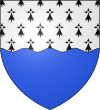Morbihan
| Morbihan | ||
|---|---|---|
| Department | ||

Prefecture building of the Morbihan department, in Vannes
|
||
|
||
 Location of Morbihan in France |
||
| Coordinates: 47°50′N 02°50′W / 47.833°N 2.833°WCoordinates: 47°50′N 02°50′W / 47.833°N 2.833°W | ||
| Country | France | |
| Region | Brittany | |
| Prefecture | Vannes | |
| Subprefectures |
Lorient Pontivy |
|
| Government | ||
| • President of the General Council | François Goulard | |
| Area | ||
| • Total | 6,823 km2 (2,634 sq mi) | |
| Population (2013) | ||
| • Total | 737,778 | |
| • Rank | 31st | |
| • Density | 110/km2 (280/sq mi) | |
| Time zone | CET (UTC+1) | |
| • Summer (DST) | CEST (UTC+2) | |
| Department number | 56 | |
| Arrondissements | 3 | |
| Cantons | 21 | |
| Communes | 256 | |
| ^1 French Land Register data, which exclude estuaries, and lakes, ponds, and glaciers larger than 1 km2 | ||
Morbihan (French pronunciation: [mɔʁbi.ɑ̃]; Breton: Mor-Bihan, Breton pronunciation: [morˈbiˑãn]) is a department in Brittany, situated in the northwest of France. It is named after the Morbihan (small sea in Breton), the enclosed sea that is the principal feature of the coastline. It is noted for its Carnac stones, which predate and are more extensive than the more familiar Stonehenge.
Morbihan is one of the original 83 departments created during the French Revolution on March 4, 1790. It was created from a part of the Duchy of Brittany.
Morbihan is part of the current region of Brittany and is surrounded by the departments of Finistère, Côtes-d'Armor, Ille-et-Vilaine, and Loire-Atlantique, and the Atlantic Ocean on the southwest.
The Gulf of Morbihan has many islands: 365 according to legend, but, in reality, between 30 and 40, depending on how they are counted. There are also many islets which are too small to be built on. Of these islands, all but two are private: l'Île-aux-Moines and l'Île-d'Arz. The others are privately owned, some by movie stars or fashion designers.
In the department of Morbihan, but outside the Gulf, there are four inhabited islands:
...
Wikipedia

